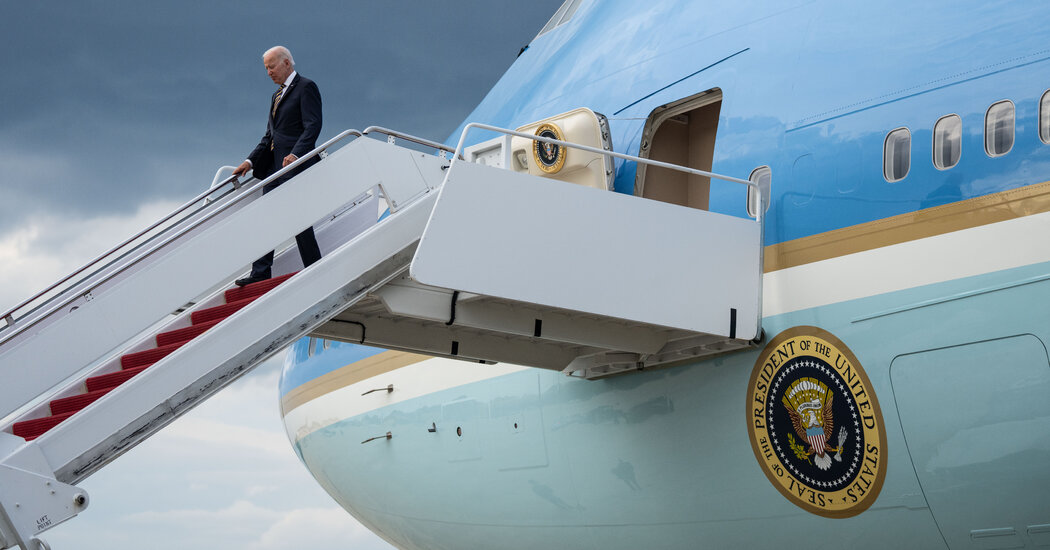
JERUSALEM — When President Biden arrives in the Middle East this week, on his first visit as American head of state, he will find a region where alliances, priorities and relations with the United States have shifted significantly since his last official trip, six years ago.
His visit opens in Israel and the occupied West Bank, once at the center of American policy in the Middle East, and is expected to focus on Israel’s fast-strengthening ties with Arab countries and an emerging Arab-Israeli military partnership to combat threats from Iran. He ends the trip in Saudi Arabia, the Persian Gulf state that the West wants to pump out more oil as a salve to a growing global energy crisis set off by the war in Ukraine.
When Mr. Biden last visited Israel in 2016 as vice president, the country had diplomatic ties with just two Arab states, Egypt and Jordan. But now, it is increasingly embedded within the diplomatic ecosystem of the Middle East after several landmark deals brokered by the Trump administration that normalized relations between Israel and three other Arab states: Bahrain, Morocco and the United Arab Emirates.
In the West Bank, Mr. Biden will meet with Palestinian officials and may announce new economic support. But analysts and diplomats said that they did not expect major developments in Israeli-Palestinian relations.
“U.S. engagement, let alone presidential involvement, in the Israeli-Palestinian conflict is no longer a priority,” said Alon Pinkas, an Israeli former consul general in New York. “The U.S. has reverted or shifted to alliance management, which is why an Israeli-Gulf, counter-Iranian coalition is far more important to the U.S. than solving the conflict.”
Mr. Biden and his Israeli hosts are expected to discuss the strengthening of the military coordination system between Israel, its new Arab allies and the U.S. military. Unthinkable during Mr. Biden’s last official visit, the system allows the participating armies to communicate in real time about aerial threats from Iran and its proxies, and has already been used to help bring down several drones, according to Israeli officials.
There have even been hints about the involvement of Saudi Arabia in the military coordination, which currently has no overt relationship with Israel but shares its opposition to Iran.
“We are not going to be announcing a normalization with Saudi Arabia on this trip,” Thomas R. Nides, the U.S. ambassador to Israel, said in a recent podcast hosted by the Israeli newspaper Haaretz. But this will be the beginning of a process that will “show the importance of regional security,” he added.
Historically, Saudi officials have said that they will avoid a formal relationship with Israel until the creation of a Palestinian state. But leading Saudis have become increasingly critical of the Palestinian leadership, and two Saudi commentators expressed support for normalization with Israel in recent days.
The Israeli news media has also reported on back-channel negotiations to increase the number of Israeli planes allowed to fly over the Saudi mainland, and to secure Israel’s blessing to change the role of international peacekeepers on two strategic small islands near Israel’s southern coast that Egypt handed over to Saudi Arabia in 2017.
An Israeli minister, Esawi Frej, also said on Thursday that he had asked Saudi Arabia to allow direct flights from Israel to facilitate pilgrimages to Mecca by members of Israel’s Muslim minority.
“There is new closeness between Israel and the Gulf,” said Itamar Rabinovich, a former Israeli ambassador to Washington. “The question is: Can the United States try to take all these different bricks and build something new with them?”
Mr. Biden’s visit will also give the United States a chance to bridge its differences with the Israeli government over how to contain Iran’s nuclear program.
Since the departure a year ago of Benjamin Netanyahu, the Israeli former prime minister who had a fractious relationship with the Democratic Party, ties between Israel and the United States have improved. Both sides speak of warm interactions, and there have been no major public spats.
That dynamic remains despite the recent collapse of Israel’s government and the installation of an interim prime minister, Yair Lapid.
Nevertheless, in private, Israel has opposed American-backed efforts to persuade Iran to scale back its nuclear program in exchange for sanctions relief — and Mr. Biden’s arrival is partly an effort to reassure Israel that Washington has its back.
“No one’s going to hold the light to Joe Biden’s commitment and love for the State of Israel,” Mr. Nides said on the podcast. “The security of Israel is of utmost importance in the United States.”
Mr. Biden’s talks with the Palestinians promise to be more fraught, however.
The last time Mr. Biden visited, the latest Israeli-Palestinian peace negotiations, brokered by the last Democratic administration, had recently broken down. Renewed talks are considered highly unlikely amid dwindling hopes of an end to the Israeli occupation of the West Bank in the near future and diminished American interest in seeking one.
U.S. officials, including Mr. Nides, stress that the Biden administration believes in a two-state solution to the conflict. But the entrenchment of Israeli settlements in the West Bank, divisions within the Palestinian leadership and Israeli disinterest in peace negotiations all make a Palestinian state seem like an increasingly distant possibility, analysts said.
The Biden administration says it has restored about $500 million in funding for Palestinians, including for the United Nations department that provides for Palestinian refugees. It has also criticized actions, including settlement expansion, that make a two-state solution less viable.
But it has also failed to reverse several measures taken by the Trump administration that Palestinians saw as undermining their quest.
The State Department has not formally rescinded a Trump administration decision to bestow legitimacy on Israeli settlements in the West Bank, considered illegal by most of the world. It was a reversal of decades of U.S. policy.
After Israeli pressure, the United States has not reopened its consulate to the Palestinians in Jerusalem, which was closed under Mr. Trump. The Palestinian mission in Washington, also shuttered under Mr. Trump, remains closed.
Palestinian anger rose again this past week, after the United States concluded that Shireen Abu Akleh, a prominent Palestinian American journalist shot dead in the West Bank in May, was most likely killed by accident and said that it would not push Israel to pursue a criminal investigation into any Israeli soldier.
The Palestinian Authority, which administers parts of the West Bank, accused Israel of killing Ms. Abu Akleh intentionally, and a number of Palestinians, as well as the journalist’s family, considered the American announcement an attempt to shield Israel from accountability — a claim Washington denied.
“All in all, from a Palestinian perspective, the administration has not done what it needs or what it takes in order to fix the damage that was done,” said Ibrahim Dalalsha, a former liaison between the U.S. government and the Palestinian leadership and director of the Horizon Center, a research group in the West Bank.
Mr. Biden’s visit is unlikely to significantly change that dynamic.
Mr. Lapid, the Israeli prime minister, broadly supports the concept of a Palestinian state, unlike his predecessor, Naftali Bennett. But Mr. Lapid is only in his role on an interim basis, pending elections in the fall, and he lacks the mandate to change the current situation.
Even so, Palestinian officials said that they hoped the U.S. administration might at least persuade Israel to implement lower-profile projects, such as a 4G mobile network in Palestinian-run areas of the West Bank.
“Maybe this is not exactly the right time for the administration to push for a final status solution,” Mr. Dalalsha said.
But, he added, “This administration has failed to get the Israelis to deliver on a meaningful set of confidence-building measures.”




